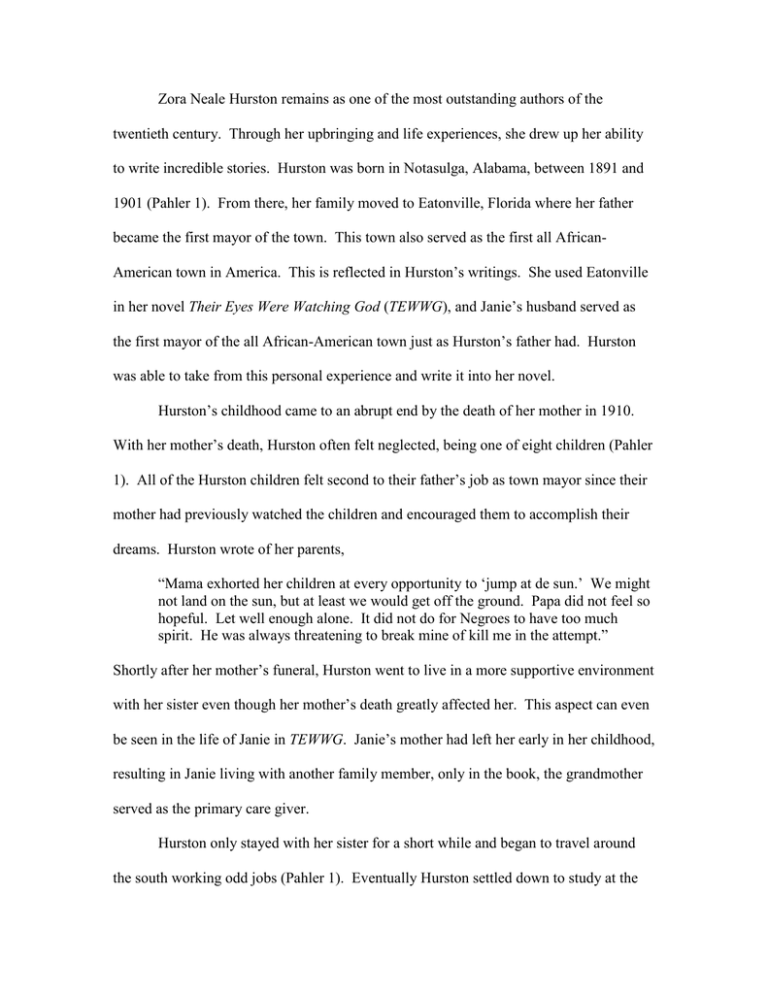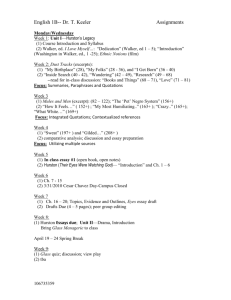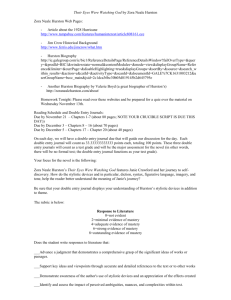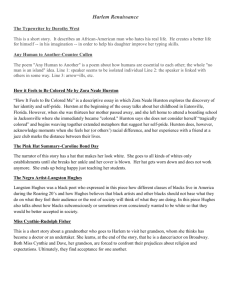Zora Neale Hurston remains as one of the most outstanding... twentieth century. Through her upbringing and life experiences, she...
advertisement

Zora Neale Hurston remains as one of the most outstanding authors of the twentieth century. Through her upbringing and life experiences, she drew up her ability to write incredible stories. Hurston was born in Notasulga, Alabama, between 1891 and 1901 (Pahler 1). From there, her family moved to Eatonville, Florida where her father became the first mayor of the town. This town also served as the first all AfricanAmerican town in America. This is reflected in Hurston’s writings. She used Eatonville in her novel Their Eyes Were Watching God (TEWWG), and Janie’s husband served as the first mayor of the all African-American town just as Hurston’s father had. Hurston was able to take from this personal experience and write it into her novel. Hurston’s childhood came to an abrupt end by the death of her mother in 1910. With her mother’s death, Hurston often felt neglected, being one of eight children (Pahler 1). All of the Hurston children felt second to their father’s job as town mayor since their mother had previously watched the children and encouraged them to accomplish their dreams. Hurston wrote of her parents, “Mama exhorted her children at every opportunity to ‘jump at de sun.’ We might not land on the sun, but at least we would get off the ground. Papa did not feel so hopeful. Let well enough alone. It did not do for Negroes to have too much spirit. He was always threatening to break mine of kill me in the attempt.” Shortly after her mother’s funeral, Hurston went to live in a more supportive environment with her sister even though her mother’s death greatly affected her. This aspect can even be seen in the life of Janie in TEWWG. Janie’s mother had left her early in her childhood, resulting in Janie living with another family member, only in the book, the grandmother served as the primary care giver. Hurston only stayed with her sister for a short while and began to travel around the south working odd jobs (Pahler 1). Eventually Hurston settled down to study at the Morgan Academy, a preparatory school for African-Americans. After graduating in 1918, Hurston enrolled at Howard University in Washington, D.C. until 1924 when she left without completing her degree. “She left school to seek her next calling, living on the meager earnings received from the short stories she sold…” (Pahler 2). Through the nomadic tendencies in her life, Hurston can be compared to the character once again of Janie, in which they both place little value upon making commitments. Whenever the urge struck, Hurston, like Janie, set out to change her fortune and left the situation, which she found constraining. This action led Hurston to New York City. While at New York, Hurston was offered a scholarship to Bernard College (Pahler 2). Hurston readily accepted and also took up a secretarial position to Fannie Hurst. These two opportunities opened the door to a great period of growth for Hurston. She learned from Hurst’s example and studied anthropology at Barnard. Through these events, Hurston greatly improved her knowledge and writing. Upon receiving her bachelor’s degree, Hurston began to work on a graduate study at Columbia University; however, she remained unable to stay in one place (Pahler 2). Hurston returned south and began to collect folklore primarily in the state of Florida. She then began to write novels based upon her vast background and recent studies. In 1937, Hurston produced her most autobiographical, and often described as her greatest, work Their Eyes Were Watching God (Pahler 3). Following this publication, Hurston received two Guggenheim fellowships and toured Jamaica, Haiti, Bermuda, and Honduras, in which she collected more information on folklores of those areas (Pahler 4). She once again used her findings in following novels. She then collaborated all of her memories and studies into the production of an autobiography. This was published in 1942 and was her last major success. Hurston then bought a houseboat and presided in Daytona Beach, Florida (Pahler 4). From there, Hurston worked as a freelance writer and served on the writing staff of Paramount Pictures. She also advocated her outdated political views on segregation, believing that the races should remain separate in which the African-Americans can attain a separate advance form the white race. Towards the end of her life, Hurston fell into poverty and suffered a stroke. She was admitted into a welfare home in Fort Pierce, Florida, where she died shortly after on January 28, 1959.



